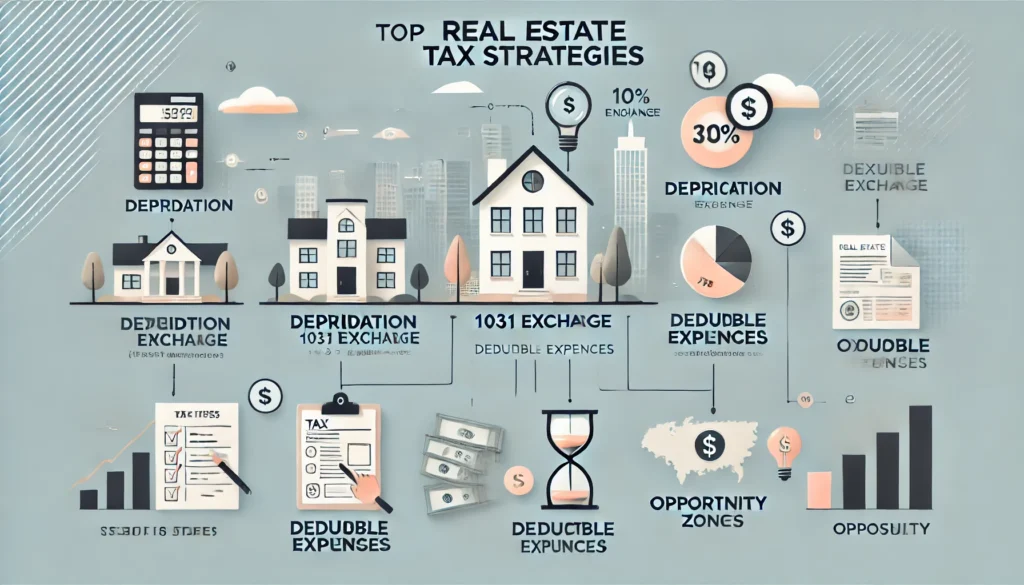Real estate is one of the most powerful wealth-building tools available—but only if you know how to work the tax system to your advantage. Whether you’re a first-time investor or an experienced property owner, understanding the tax strategies available to you can make a significant difference in your bottom line. In this guide, we’ll uncover the top tax-saving secrets in real estate and how to use them to maximize profit and minimize taxes legally.

1. Depreciation: The Silent Tax Shield
Depreciation allows you to deduct the cost of wear and tear on your property over time—even if your property is increasing in market value. Residential properties can typically be depreciated over 27.5 years, while commercial properties depreciate over 39 years.
Pro Tip: Consider a cost segregation study to accelerate depreciation. This technique breaks down the components of a property (carpets, appliances, landscaping, etc.) and allows you to depreciate them faster, leading to front-loaded tax deductions.
2. 1031 Exchange: Delay Capital Gains Taxes
A 1031 exchange allows you to defer paying capital gains taxes when you sell one investment property and reinvest the proceeds into a like-kind property.
Key Rules:
- The new property must be identified within 45 days.
- The transaction must be completed within 180 days.
- The replacement property must be of equal or greater value.
Pro Tip: Work with a qualified intermediary to handle the exchange. Mistakes in timing or structure can invalidate the entire deferral.

3. Deductible Expenses: Know What You Can Write Off
As a property owner, many of your day-to-day expenses are tax-deductible, including:
- Mortgage interest
- Property taxes
- Repairs and maintenance
- Property management fees
- Insurance premiums
- Travel related to property oversight
Pro Tip: Keep detailed records and receipts. Use accounting software or hire a bookkeeper to ensure you don’t miss a single deduction.
4. Passive Loss Rules & Real Estate Professional Status
Most rental losses are considered “passive” and can’t be used to offset active income—unless you qualify as a real estate professional.
How to Qualify:
- Spend more than 750 hours per year in real estate activities
- More than 50% of your total working time must be in real estate
Pro Tip: If you or your spouse can qualify, the tax benefits can be significant. You can use rental losses to offset W-2 income and reduce your overall tax bill.
5. Short-Term Rentals: Know the Rules
Short-term rentals like Airbnb can offer both higher income and unique tax treatment.
Important Factors:
- If you rent the property for fewer than 14 days per year, the income is completely tax-free.
- If you rent more than 14 days and provide substantial services (like daily cleaning or breakfast), it may be treated as active business income.
Pro Tip: Track your rental days and services provided. The IRS rules are nuanced, and proper categorization can impact your taxes dramatically.
6. Opportunity Zones: Invest with Impact and Save
Investing in Qualified Opportunity Zones (QOZs) can offer tax incentives, including:
- Deferral of capital gains until 2026
- A potential 10-15% reduction of gains if held long enough
- Tax-free growth if the investment is held for 10+ years
Pro Tip: Do your due diligence. Not all QOZ investments are created equal—seek professional guidance and choose wisely.
7. Entity Structuring: LLCs, Partnerships, and Trusts
Choosing the right entity for your real estate investments can offer liability protection and tax efficiency.
- LLCs provide protection and pass-through taxation.
- S-Corps may be beneficial for short-term property flipping.
- Trusts can be used for estate planning and asset protection.
Pro Tip: Consult with a CPA and an attorney to design an entity structure that fits your investment strategy and future goals.
8. Installment Sales: Spread Out Your Tax Burden
Instead of taking a lump sum when selling a property, consider an installment sale where the buyer pays over time. This allows you to spread the capital gains tax across multiple years.
Pro Tip: Make sure to charge interest on installment payments and include all terms in a formal contract. This strategy is especially helpful in high-income years.
9. Home Office Deduction (for Investors & Landlords)
If you manage your properties from home, you may qualify for a home office deduction.
Eligible Costs Include:
- A portion of rent or mortgage
- Utilities
- Internet and phone service
Pro Tip: The space must be used exclusively and regularly for business purposes. Keep photos and documentation as backup in case of audit.
10. Work with a Real Estate-Savvy CPA
Even the best tax strategies fall short without expert implementation. A CPA who specializes in real estate will help you:
- Identify and apply every available deduction
- Structure your investments for maximum efficiency
- Stay compliant with ever-changing tax laws
Final Thoughts
The tax code is complex, but with the right strategies, it becomes a powerful tool for building real estate wealth. By leveraging these real estate tax secrets, you can keep more of your profits, reduce your risk, and make smarter financial decisions.
At CR Tax Advisors, we specialize in helping real estate investors and entrepreneurs unlock hidden savings and maximize returns. Book your free consultation today and start building smarter.